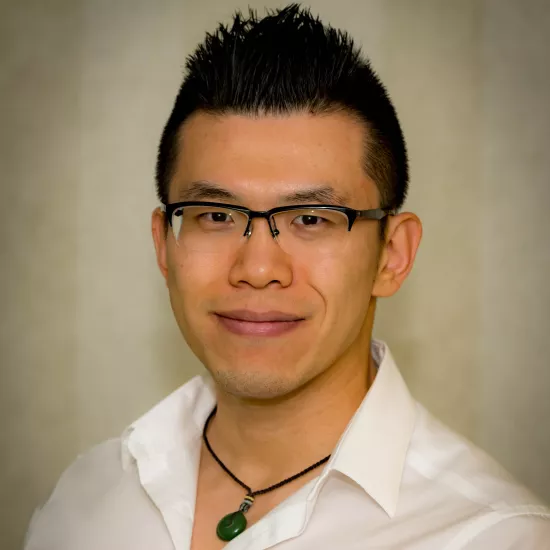
Zhaozhe Wang
-
E-mail:
-
Room:MN 5103
Zhaozhe Wang (pronunciation: “jaw-juh”) is an Assistant Professor of Writing and Rhetoric Studies in the Institute for the Study of University Pedagogy with a graduate appointment in the Department of Curriculum, Teaching and Learning at OISE. He is also affiliated with the Centre for Educational Research on Languages and Literacies (CERLL) and the Comparative, International and Development Education Centre (CIDEC).
Zhaozhe Wang specializes in writing and rhetoric studies, with particular interests in areas such as multilingual/translingual writing and literacy, second language writing, transnational rhetorics, digital media, and digital/AI literacy. He has served on the CCCC (Conference on College Composition and Communication) Executive Committee. He has also chaired the CCCC Second Language Writing Standing Group and MLA (Modern Language Association) Global English Forum Executive Committee.
Zhaozhe Wang is recipient of the CCCC James Berlin Memorial Outstanding Dissertation Award, Rhetoric ReviewTheresa J. Enos Anniversary Award, and WPA: Writing Program Administration Kenneth Bruffee Award. His scholarship is published in leading journals across writing and rhetoric studies, communication, and applied linguistics, including College Composition and Communication, College English, Composition Studies, Computers and Composition, Journal of Second Language Writing, Quarterly Journal of Speech, Rhetoric Review, Rhetoric Society Quarterly, Writing Program Administration, among others.
With Tony Silva, he co-edited Reconciling Translingualism and Second Language Writing. His monograph, titled Doing Difference Differently: Chinese International Students' Literacy Practices and Affordances (Utah State University Press), ethnographically documents the multifaceted everyday literate activities of Chinese international students, challenging the myth of linguistic and cultural differences reified in institutional discourses of diversity.
For the most up-to-date information, please see Zhaozhe Wang’s Discover Research page.
Availability
Master’s or PhD student supervision (Language and Literacies Education @OISE)
Collaborative projects
Media enquiries
Publications
Selected Publications
Books
Wang, Z. (2024). Doing Difference Differently: Chinese International Students’ Literacy Practices and Affordances. Utah State University Press.
Silva, T., & Wang, Z. (Eds.). (2021). Reconciling translingualism and second language writing. Routledge.
Refereed Journal Articles
Wang, Z., & Wang, C. (2025). A posthumanist approach to AI literacy. Computers and Composition, 76, 102933.
Wang, C., & Wang, Z. (2025). Investigating L2 writers’ critical AI literacy in AI-assisted writing: An APSE model. Journal of Second Language Writing, 67, 101187.
Wang, Z. (2024). Post-rhetoric: A rhetorical profile of the generative artificial intelligence chatbot. Rhetoric Review, 43(3), 155-172. (Rhetoric Review Theresa J. Enos Anniversary Award Honorable Mention)
Wang, Z. (2023). Transnational rhetorical circulation in the splinternet age. Rhetoric Society Quarterly, 53(5), 670-684.
Zhang-Wu, Q., Wang, Z., & Shapiro, S. (2023). CLA and translingualism: A (literal) scholarly conversation. Journal of Second Language Writing, 60, 100996.
Wang, Z. (2022). Rhetorical economy: Affect, labor, and capital in transnational digital circulation. Quarterly Journal of Speech, 108(4), 382-401.
Wang, Z. (2022). From disciplinary diaspora to transdisciplinarity: A home for second language writing professionals in composition. College English, 84(5), 467-490.
Wang, Z. (2021). The switched-off circulation: A rhetoric of disconnect. Rhetoric Review, 40(4), 395-411. (Rhetoric Review Theresa J. Enos Anniversary Award)
Wang, Z. (2021). Too green to talk disciplinarity. Composition Studies, 49(1), 172-175.
Wang, Z. (2020). Toward a rhetorical model of directed self-placement. WPA: Writing Program Administration, 44(1), 45-67. (Kenneth Bruffee Award)
Wang, Z. (2020). Activist rhetoric in transnational cyber-public spaces: Toward a comparative materialist approach. Rhetoric Society Quarterly, 50(4), 240-253.
Wang, Z. (2020). First-year writing instructors’ perceived challenges in working with international second language writers: An institutional survey study. Chinese Journal of Second Language Writing, 1(1), 111-131.
With Silva, T., Zhang, C. A., Chen, Y., Li, Y., Yang, K., & Sun, Y. (2020). Doctoral study in second language writing studies in the United States: Some Chinese Students’ Perspectives. Chinese Journal of Second Language Writing, 1(1), 1-17.
Wang, Z. (2019). Relive differences through a material flashback. College Composition and Communication, 70(3), 380-412.
Wang, Z. (2019). Carving out a dialogic space for “I”: A corpus-based study of novice L2 writers’ use of first-person pronouns in argumentative essays. L2 Journal, 11(1), 20-34.
Wang, Z. (2018). Rethinking translingual as a transdisciplinary rhetoric: Broadening the dialogic space. Composition Forum, 40.
Book Chapters
Wang, Z. (2022). Auto-ethnographic performance of differences as anti-racist pedagogy. In B. Schreiber, E. Lee, J. Johnson, & N. Fahim (Eds.), Linguistic Justice on Campus: Pedagogy and Advocacy for Multilingual Students (pp. 41-57). Multilingual Matters.
Wang, Z., & Silva, T. (2021). Introduction: Reconciling translingualism and second language writing. In T. Silva & Z. Wang (Eds.), Reconciling Translingualism and Second Language Writing (pp. 1-10). Routledge.
